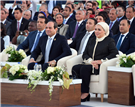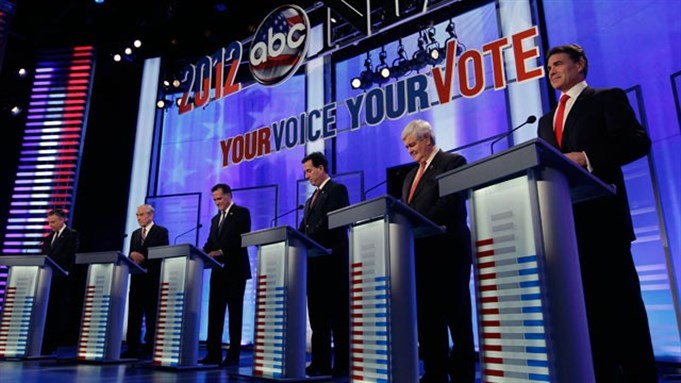With the deepening of a political stalemate between the government and the opposition in Egypt and the marked deterioration of economic conditions, critics of the January 25 Revolution continue to highlight what they view as the revolution’s failure to bring about a stable political order that can live up to the many political and economic challenges Egypt confronts today.
In his always-illustrious column in Al-Masry Al-Youm, Abdel Moneim Saeed eloquently articulated this consensus over successive pieces in the course of the past month. He reflects on the inability of the “new” political elite that emerged in the wake of the revolution to move beyond the opportunism that marred Hosni Mubarak-era statesmen and politicians to develop a meaningful vision that could allow Egypt to close off what he characterizes as a developmental gap with the rest of the world.
Saeed’s latest piece, “The Exit Door,” attempts to identify a way out of the current crisis and the underlying instability, and more broadly, a way to break with recurrent patterns of despotic governance that have characterized most of Egypt’s modern history. The solution, he provocatively says, lies in property rights and elections.
If citizens rather than the state owned property, the reasoning goes, they would enjoy greater freedoms and sufficient autonomy to protect themselves against state abuses.
He writes: “In free, developed countries, people own their homeland, and they do not just benefit from it for a finite number of years. And for those who do not know this, the origin of liberty is property, because he who does not own cannot be independent of the state, since if the state owned his subsistence, it would also own his vote and his life.”
The second part of the so-called solution is internationally monitored free and fair elections, which could resolve the current stalemate between the government and the opposition by creating a political environment in which today’s losers are aware they can be tomorrow’s winners.
“Dealing with the opposition is not a secret to anyone, and whoever wants to rid himself of the aches of doubts, misgivings and mistrust only has to do what the majority of the world’s new democracies have done, [namely] the adoption of international monitoring of elections through the United Nations, and not through Jimmy Carter [the Carter Center]. In short, we need to adopt the international game of politics in order for, and this is possible, everyone to act properly once they know that power can be transferred peacefully through the ballot boxes, which do not cede to one side forever,” Saeed says.
In some ways, Saeed’s perspective reflects a dominant liberal consensus that embraces the assumption that political institutions, if appropriately constructed and configured, combined with negative liberties, could in fact steer a country like Egypt away from the current crisis and toward a more stable democratic equilibrium. In other words, the major challenges at hand revolve around getting the political institutions “right.”
What this viewpoint overlooks, intentionally or not, is the substance of the social conflicts that have animated waves of popular mobilization since, and even before, the outbreak of the January 25 Revolution. To say that social and economic grievances have been at the forefront of popular discontent that has advanced, and continues to advance, the contention between the Egyptian people and their state over the past decade is an understatement.
If we were to take this claim at face value, it becomes no longer viable to proceed on the assumption that waves of popular dissent in Egypt would disappear once the Muslim Brotherhood and its challengers agree on an alternative constitution, a power-sharing arrangement, a new elections law or an elections monitoring mechanism.
That is because, contrary to the wishful thinking of large segments of the Egyptian elite, the January 25 Revolution and the popular mobilization it advanced were not merely the manifestation of a purely political revolt aimed at toppling a dictatorship and institutionalizing liberal democratic procedures. The target of the revolution was more than just the autocratic political system, but equally important, longstanding exclusionary economic policies that continue to fall short of meeting popular expectations for distributive justice.
In this context, the so-called exit from the underlying crisis lies not in simply “getting political institutions right,” but first and foremost in building a new social pact between the Egyptian state and its people, to redefine the terms of economic development in ways that are consistent with popular demands for economic and social rights.
It takes a lot of diligence to ignore the fact that the past two years have witnessed the collapse of the very same liberal prescription that Saeed proposes as a possible way to end Egypt’s woes. Egyptians have gone to the polls several times, and elected a president and a parliament. Yet despite successive trips to the ballot box, anti-state popular mobilization has not subsided and has arguably intensified.
At times, and quite puzzlingly for liberal elites, anti-state mobilization has called for the downfall of democratically elected institutions and officials.
It is perhaps because of this inconvenient reality that Saeed qualifies his claim that elections are capable of resolving the current crisis, by adding that the United Nations, and not “Jimmy Carter,” must be tasked with election monitoring — as if the credibility of international observers in the past elections can sufficiently account for why these polls have failed to quell popular discontent in Egypt.
Setting aside the absurdity of this reasoning, I would argue that the failure of successive elections in Egypt since 2011 is not due to their technical mishandling, but due to what they failed to produce — namely, a social contract that could deliver the “social justice” in “bread, freedom and social justice.” Such an argument becomes even more compelling as we watch elected officials reinvent the exclusionary economic policies of the Mubarak era, while negotiating with the International Monetary Fund behind closed doors over the future of the Egyptian economy, without much consultation with domestic constituents and stakeholders.
Some may argue that free and fair elections, if properly conducted, are fully capable of producing a government that reflects the promise of the January 25 Revolution and its partisans. Yet this line of reasoning conveniently overlooks the distortive role that electoral politics play in pushing out of the national political arena issues and agendas that concern socially marginalized classes.
The experience of the 2011/12 elections is a case in point. The failure of partisans of distributive justice, such as the Revolution Continues Alliance, to secure meaningful representation in Parliament speaks to a reality in which big money and parties of privilege — whether Islamist or secular — dominate the electoral arena, making it extremely difficult for political allies of the marginalized to really succeed in national politics.
In such a context, the liberal prescription of free and fair elections confronts an insurmountable paradox: How can elections create a national political arena capable of resolving pressing conflicts over economic and social rights if those who lack and demand these rights are constantly crowded out of this same arena by default? In this respect, the power that liberals attribute to free and fair elections to resolve the social conflicts that are tearing Egypt apart today is little more than an illusion.
The class compromises required for an “exit door” from the current predicament are too deep to be resolved through the electoral process, no matter how “free and fair.”
[This piece was written for Egypt Independent`s final weekly print edition, which was banned from going to press.]
![[A passerby in East Alexandria gives money to a beggar under the sign of freedom. Photo by Amro Ali]](https://kms.jadaliyya.com/Images/357x383xo/Amro26.png)

















